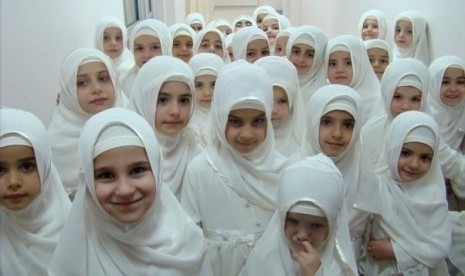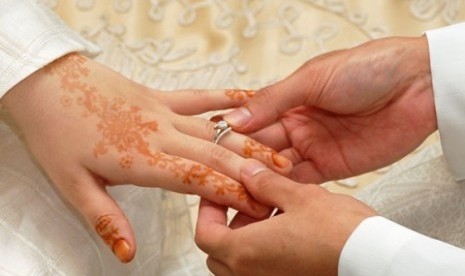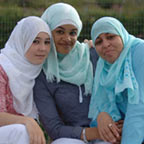Hijab Style Of Indonesian College Teens
This paper is inspired by the writings of a sister my brother style. The essence of the article that I catch is, how monotonous brother in appearance. Starting from a white cap, a thin beard, koko thin, high pants and flip-flops. Without intending to bring up again or protest the way friends dressed but this paper will speak of other things, which is about the appearance sisters.
Veil recently used the Muslim gathering popularity. With a variety of models and patterns, some Muslim women wear the hijab are becoming increasingly tempted. This trend may not wear hijab because of me-too fashion or like words .... follow the middle-eastern culture, but because there was something else, an understanding of Muslim women will command had clearly mentioned in Al-Qur'an. Alongside with this, fall is also the opinion of some people who say that the veil is a dull outfit.
Among activist propaganda, especially students, the veil can be a separate identity from the city showing where he came from, even from the campus where he came from. A case study in the city-because-I study in Bandung, famous for its colorful scarf, dynamic and fashionable impressed. This may be different from those in the east (Java) who supposedly said hijab "more stringent"
However, although on average it tends headscarf in fashionable London-fashionable but there were also differences between campuses in Bandung. If I observe once heard about the appearance of activist sisters at some state universities in Bandung, then I can say that: coed UPI (University of Education Indonesia) famous for their elegant hijab-elegant, feminine (masculine weve no veil?), And impressed adults with superior long-most nearly knee-and wide hood with matching shirt. As with the ITB (Bandung Institute of Technology), ITB famous sisters hood width, length tops slightly less than sisters UPI or her long dress, sling backpack and sneakers.
Another with Pdjadjaran University, probably because it was in the city as well, and who do not wear veils girl student also have a modern fashionable, there are also many activists sisters appear fashionable, at least it might look from the style and type of clothing, hoods, and other fashionable styles.
At least that's what I caught when I met some colleagues from other campuses while the action or are no events to other Islamization. If there is less agree, I would accept it gracefully.
Actually, come to think of my own, no matter the style hijab sisters were like, as long as it is still within the limits of sharia. But then there are things that simply make me tingle, that the sisters clothing is often a concern not just fellow sisters but also people amma even brother! Styles can also be a typical one, for example, in terms of clothing, it's a typical sisters while sisters B such that as it is, can make people become familiar even with one's gait.
Typically a campus-style headscarf is not a big pemasalah long veil is still on the guidance of the shari'ah. Would be a big problem if the rules are not written in stone about the hijab violated. As with her trademark style hijab sisters Bandung, I think it needs no comment much. I just think there are some that may be more attention. Some of these things are about the duffel bag might be better if we did not rely directly on our backs because somehow it can make the contours of your body seen in quite clearly, if we still want our backpacks may be affixed to the inside back of the veil although frankly we can make us like "ninja turtle" but insha Allah, this is much more secure than we put on our backpacks directly outside our hood.
Then about a long-short tops that like to wear clothes to superiors and subordinates, it might be a good idea if our boss clothing at least one inch in length from the knee or if it could be more than that, for security. Insha Allah, we will be safer that way because if for example one day we should be subject to the outfit would not be exposed to the waist but are more than twenty centian below the waist. Last possible about the veil, again for safety, it might be better if the veil or khimar are taking at least one inch in length from the shoulder.
How do we hang our bags, how long underwear over us, or how wide the hood we actually did not determine the quality of one's faith even tarbiyah but in this case there may be some things that should be given serious attention.
Maybe this is my observations after almost two years of living in London.
Afwan minkum if anyone hurt her, believe me never the slightest intention.
Annisa Masyitoh
This paper is inspired by the writings of a sister my brother style. The essence of the article that I catch is, how monotonous brother in appearance. Starting from a white cap, a thin beard, koko thin, high pants and flip-flops. Without intending to bring up again or protest the way friends dressed but this paper will speak of other things, which is about the appearance sisters.
Veil recently used the Muslim gathering popularity. With a variety of models and patterns, some Muslim women wear the hijab are becoming increasingly tempted. This trend may not wear hijab because of me-too fashion or like words .... follow the middle-eastern culture, but because there was something else, an understanding of Muslim women will command had clearly mentioned in Al-Qur'an. Alongside with this, fall is also the opinion of some people who say that the veil is a dull outfit.
Among activist propaganda, especially students, the veil can be a separate identity from the city showing where he came from, even from the campus where he came from. A case study in the city-because-I study in Bandung, famous for its colorful scarf, dynamic and fashionable impressed. This may be different from those in the east (Java) who supposedly said hijab "more stringent"
However, although on average it tends headscarf in fashionable London-fashionable but there were also differences between campuses in Bandung. If I observe once heard about the appearance of activist sisters at some state universities in Bandung, then I can say that: coed UPI (University of Education Indonesia) famous for their elegant hijab-elegant, feminine (masculine weve no veil?), And impressed adults with superior long-most nearly knee-and wide hood with matching shirt. As with the ITB (Bandung Institute of Technology), ITB famous sisters hood width, length tops slightly less than sisters UPI or her long dress, sling backpack and sneakers.
Another with Pdjadjaran University, probably because it was in the city as well, and who do not wear veils girl student also have a modern fashionable, there are also many activists sisters appear fashionable, at least it might look from the style and type of clothing, hoods, and other fashionable styles.
At least that's what I caught when I met some colleagues from other campuses while the action or are no events to other Islamization. If there is less agree, I would accept it gracefully.
Actually, come to think of my own, no matter the style hijab sisters were like, as long as it is still within the limits of sharia. But then there are things that simply make me tingle, that the sisters clothing is often a concern not just fellow sisters but also people amma even brother! Styles can also be a typical one, for example, in terms of clothing, it's a typical sisters while sisters B such that as it is, can make people become familiar even with one's gait.
Typically a campus-style headscarf is not a big pemasalah long veil is still on the guidance of the shari'ah. Would be a big problem if the rules are not written in stone about the hijab violated. As with her trademark style hijab sisters Bandung, I think it needs no comment much. I just think there are some that may be more attention. Some of these things are about the duffel bag might be better if we did not rely directly on our backs because somehow it can make the contours of your body seen in quite clearly, if we still want our backpacks may be affixed to the inside back of the veil although frankly we can make us like "ninja turtle" but insha Allah, this is much more secure than we put on our backpacks directly outside our hood.
Then about a long-short tops that like to wear clothes to superiors and subordinates, it might be a good idea if our boss clothing at least one inch in length from the knee or if it could be more than that, for security. Insha Allah, we will be safer that way because if for example one day we should be subject to the outfit would not be exposed to the waist but are more than twenty centian below the waist. Last possible about the veil, again for safety, it might be better if the veil or khimar are taking at least one inch in length from the shoulder.
How do we hang our bags, how long underwear over us, or how wide the hood we actually did not determine the quality of one's faith even tarbiyah but in this case there may be some things that should be given serious attention.
Maybe this is my observations after almost two years of living in London.
Afwan minkum if anyone hurt her, believe me never the slightest intention.
Annisa Masyitoh




















 The hijab, or headscarf, is one of the most noticeable and misunderstood badges of
The hijab, or headscarf, is one of the most noticeable and misunderstood badges of 







